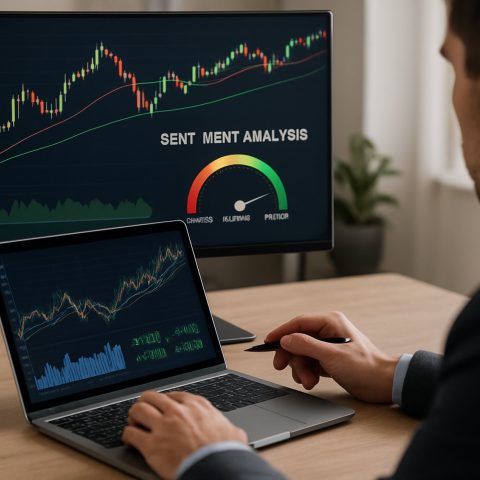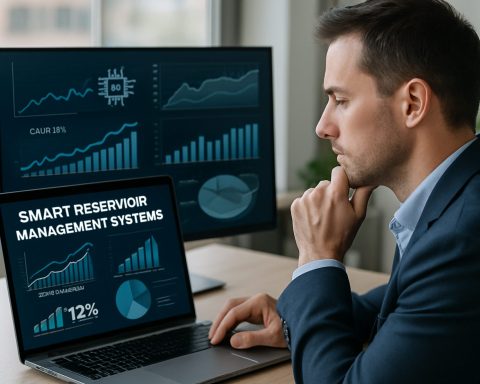In recent years, the fluctuating price of Bitcoin has captivated investors worldwide, driving a never-ending quest for insights into its behavior. The latest innovation aiming to tackle this challenge is the burgeoning use of artificial intelligence (AI) in cryptocurrency trading. This intersection of technology and finance is transforming how traders approach Bitcoin, offering potentially more precise forecasts and risk assessments.
Traditional methods of analyzing Bitcoin prices have relied heavily on historical data and market sentiment. However, the unpredictable nature of cryptocurrencies often renders these techniques insufficient. Enter AI, with its ability to process colossal datasets within moments, identify hidden patterns, and adapt to new information in real-time. Developers are now designing sophisticated AI algorithms specifically for predicting short-term Bitcoin price movements, which could herald a new era of informed trading strategies.
Proponents of AI-driven trading systems argue that they can reduce human error, emotional trading, and enhance profitability. With the integration of machine learning and natural language processing, these systems can even analyze social media sentiment—capturing the mood of the market in ways previously unimaginable. Despite this promise, skeptics question the reliability of AI in such a volatile domain, highlighting potential concerns over algorithmic bias and data privacy.
As technology continues to evolve, the fusion of AI and cryptocurrency trading could reshape the financial landscape. Whether it will ultimately decipher Bitcoin’s mysteries is yet to be seen, but one thing is certain: the future of Bitcoin trading will be increasingly intertwined with cutting-edge technology.
The Environmental Impact of AI in Cryptocurrency Trading
The rapid adoption of artificial intelligence (AI) in cryptocurrency trading, specifically in Bitcoin markets, is poised to not only revolutionize the financial landscape but also has significant implications for the environment. As technology transcends traditional methods with its superior ability to analyze market data, it introduces both opportunities and challenges regarding sustainability.
Environmental Impact:
AI-driven trading systems necessitate substantial computational power, leading to increased energy consumption. These powerful algorithms require massive data centers to operate, often resulting in a significant carbon footprint. With Bitcoin already notorious for its energy-intensive mining processes, the energy demands of AI could exacerbate environmental concerns. This intersection of AI and cryptocurrency could strain energy resources, especially if propelled by non-renewable energy sources, expanding further the environmental footprint of digital finance operations.
Implications for Humanity and the Economy:
The environmental implications underscore a pressing concern for humanity—the need to balance technological advancements with sustainable practices. As the world witnesses a surge in digital currency adoption, the associated environmental costs could influence global economic policies. Economic growth fueled by technology may necessitate rethinking energy usage, prompting shifts towards greener alternatives.
Furthermore, AI’s integration into cryptocurrency markets may drive technological inequality. While affluent nations might benefit from the financial opportunities AI presents, developing regions may bear the brunt of environmental degradation. Therefore, policies ensuring equitable technology access while mitigating environmental impacts become crucial for the global economy.
Connections to the Future of Humanity:
Looking ahead, the future of humanity intertwined with AI and cryptocurrency demands a proactive approach to sustainable innovation. By embracing renewable energy solutions and improving energy efficiency, the environmental burden can be alleviated. Strategies such as investing in greener data centers and cleaner technologies could reduce the carbon footprint associated with AI-driven Bitcoin trading.
This scenario presents an opportunity for leaders and technologists to rethink how advancements in AI and cryptocurrency can be harnessed responsibly, ensuring that the benefits of technology do not come at the expense of our planet’s health. By addressing these concerns now, humanity can stride towards a future where technological progress sustains both economic and environmental well-being.
How Artificial Intelligence is Revolutionizing Bitcoin Trading: What You Need to Know
The rapid integration of artificial intelligence (AI) in cryptocurrency trading is reshaping how traders engage with Bitcoin, introducing new tools and techniques to navigate its infamous volatility.
Key Innovations in AI-Driven Bitcoin Trading
The application of AI in Bitcoin trading is marked by several key innovations:
1. Machine Learning Algorithms: Sophisticated algorithms are being developed to predict short-term price movements, enhancing trading precision by analyzing vast amounts of data to discern patterns imperceptible to the human eye.
2. Natural Language Processing (NLP): By leveraging NLP, these systems can interpret and analyze sentiment from social media platforms, offering deeper insights into market moods and potential price impacts.
3. Real-Time Data Processing: AI systems can process colossal datasets almost instantaneously, adapting to new information and adjusting trading strategies in real-time, a crucial capability in the volatile crypto market.
Pros and Cons of AI in Bitcoin Trading
Pros:
– Enhanced Accuracy: AI systems can reduce human error and emotional decisions, improving the accuracy and outcome of trades.
– Comprehensive Data Analysis: The ability to analyze diverse data types, from market trends to social sentiments, allows for well-rounded trading strategies.
– Adaptability: AI can continuously learn from new data, refining its predictive models over time.
Cons:
– Algorithmic Bias: Concerns remain about the reliability and fairness of AI systems, which can inherit biases present in their training data.
– Data Privacy: The extensive data collection required for AI systems raises issues regarding the security and privacy of user information.
Market Trends and Predictions
The integration of AI in Bitcoin trading is expected to grow, with increasing investment and innovation in AI technologies driving this advancement. Analysts predict that as AI systems become more sophisticated, traders will increasingly rely on these tools for more accurate forecasts and risk management.
Potential Use Cases
AI-driven trading systems are particularly suited for:
– High-Frequency Trading: Where speed and accuracy are essential.
– Risk Assessment: Offering dynamic and data-driven evaluations of market risks.
– Automated Trading: Enabling hands-off management of trading portfolios by executing trades based on pre-defined conditions.
Insights on Future Developments
The continued evolution of AI technologies promises to further embed these systems in the trading ecosystem, potentially leading to more efficient and democratized access to cryptocurrency markets.
Conclusion
The intersection of AI and Bitcoin trading represents a significant shift in financial technology, underscoring a future where informed trading strategies are progressively reliant on advanced technological solutions. Whether AI will ultimately decode Bitcoin’s complexities remains uncertain, but its role in shaping the market is indisputable.
For more information on financial technologies and innovations, visit Forbes.










